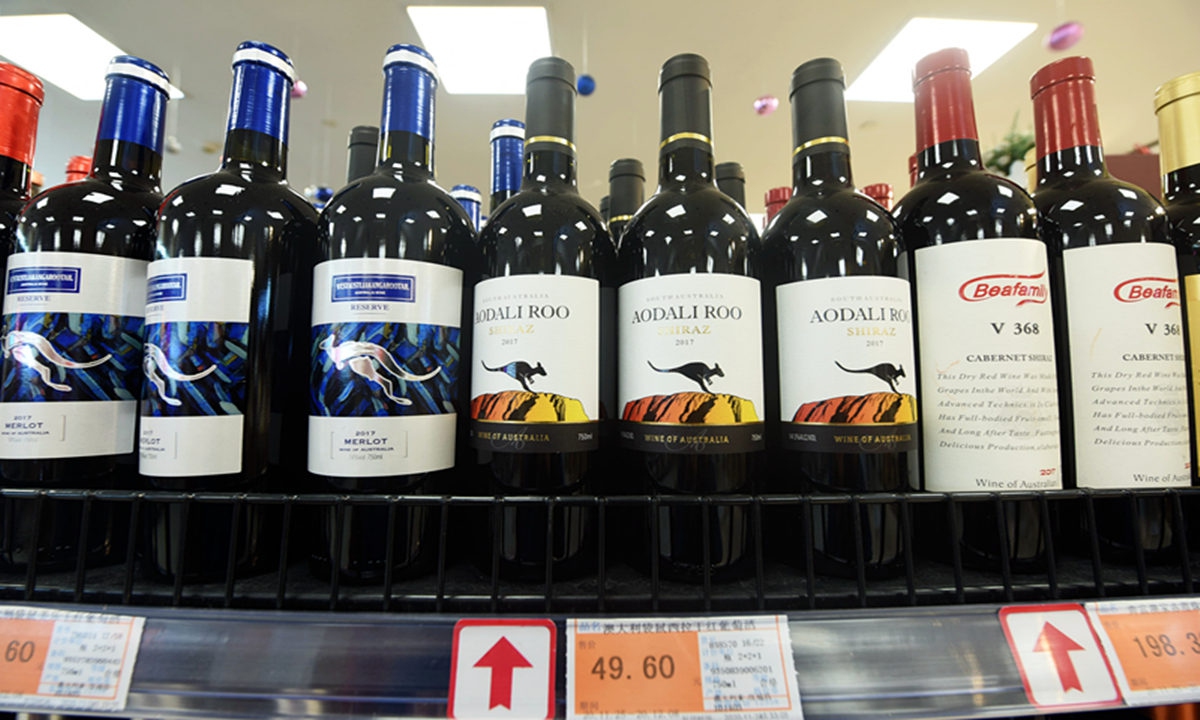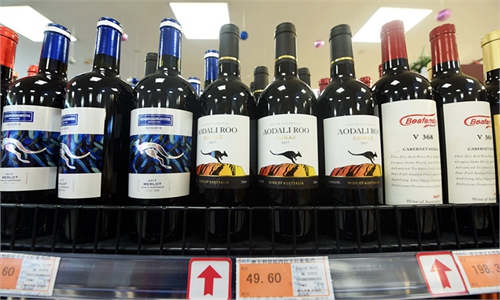Australian winemakers prepare for lifting of tariffs in China; industry insiders see opportunities amid closer trade ties, consumption recovery

Bottles of Australian wine on the shelf of a supermarket in Hangzhou, East China's Zhejiang Province on November 27, 2020 Photo: VCG
Australian winemakers are adopting proactive strategies such as increasing shipments to China's Hong Kong Special Administrative Region (HKSAR), in anticipation of the removal of tariffs on their products in the Chinese mainland, their largest market, the Global Times learned from industry insiders and media reports.
Recent actions by Australian companies once again reflected their ongoing enthusiasm for tapping into the potential opportunities, driven by the continuous improvement of bilateral trade ties between China and Australia, as well as the positive outlook for the Chinese consumption market recovery since the beginning of the year, experts said.
These remarks came as media reports said that Australian winemakers have shipped millions of bottles of wine to the HKSAR in a bet that China will soon lift tariffs on Australian wine and revive a trade worth hundreds of millions of dollars, Reuters reported, citing industry figures and trade data.
In a letter to the Global Times on Monday, Treasury Wine Estates (TWE), an Australian global winemaker, said that it is "prepared and well-placed to commence re-establishing its Australian country of origin portfolio in China should the current review into tariffs on Australian wine imports see their removal," referring to the company's recently announced interim results.
TWE denied that it's shipping wine to a Hong Kong warehouse "ahead of any potential changes to China tariffs on Australian wine."
The Chinese Ministry of Commerce (MOFCOM) began reviewing the anti-dumping and countervailing duties on Australian wine as of November 30, 2023. A five-year series of anti-dumping and countervailing tariffs on Australian wines was imposed on March 28, 2021.
The review period is expected to last for one year, ending before November 30, 2024, according to the MOFCOM.
Some Australian government officials, media outlets and industry insiders believe that the tariffs will be lifted in early 2024, according to media reports.
A senior insider with a Chinese wine industry group told the Global Times on Monday that the review regarding tariff lifting is underway and there is no update at present.
When it comes to the specific timeline for the review, the insider said that it is ultimately up to the Chinese side, not the Australian side. The insider urged the Australian side to remain patient, noting that the corresponding department in China has already taken active steps over the matter.
According to industry statistics, Australian wine accounted for 35.54 percent of China's wine market in 2019, surpassing France and holding the largest market share, before losing share to French and Chilean wines after the imposition of anti-dumping tariffs and soured bilateral relations.
The recent active moves by the Australian winemakers showed that their confidence in the Chinese market remains unchanged, industry insiders said.
"Amid a global wine market characterized by weak consumption and an oversupply, they [Australian winemakers] view the Chinese market as a potential avenue for business growth," the insider said.
Bilateral trade delivered impressive results in 2023, as widely expected, rising 9.8 percent year-on-year and surpassing the pre-pandemic level in 2019, according to data released by China's General Administration of Customs (GAC) on January 12, 2024.
China's imports of Australian coal recovered to more than 50 million tons in 2023 from a trivial amount in the previous year, GAC data showed.
Experts said that the latest statistics highlight strong economic and trade complementarity, underscored by ongoing enhancements in bilateral relations, marked by frequent high-level interactions.
The resurgence of key Australian export commodities, including barley, wool and coal, has further propelled trade growth.
Chen Hong, director of the Australian Studies Center of East China Normal University, told the Global Times on Monday that there is a strong sense of desperation from the Australian side, including wine producers and distributors, as well as the Australian government, all of which eagerly hope for tariff changes in order to quickly regain the vast Chinese market.
Despite some Australian media hyped up the so-called alternative markets for Australian goods like wine and barley, the reality proves otherwise, the expert noted.
Meanwhile, with the Labor government now entering the latter half of its term, with federal parliamentary election expected in next year, the Albanese administration urgently looks to achieve political gains, such as resolving issues like the previous barley dispute and the current wine issue, Chen said.
Chinese experts expressed optimism about the further improvement of bilateral economic and trade ties this year, especially with China's economic recovery, evident through the strong consumption rebound during the just-ended Chinese Lunar New Year holidays.
"Although there are some technical issues, they are not insurmountable obstacles, provided both sides are sincere in addressing these issues together, unlike the previous Morrison administration that politicized the issues and launched political attacks," Chen said.
With joint efforts from both sides, it is expected that more Australian products such as wine and lobsters may return to the Chinese market in the not too far future, the Chinese expert said.

